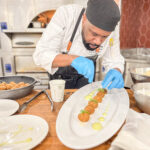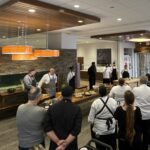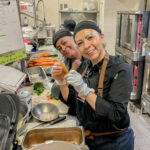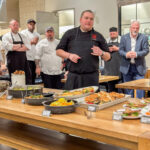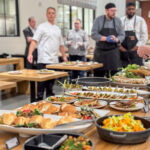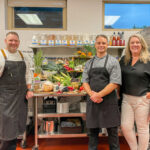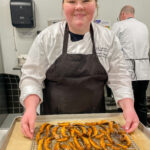Plant-Forward Trainings Inspire and Unite Bon Appétiters
- by Peter Todaro
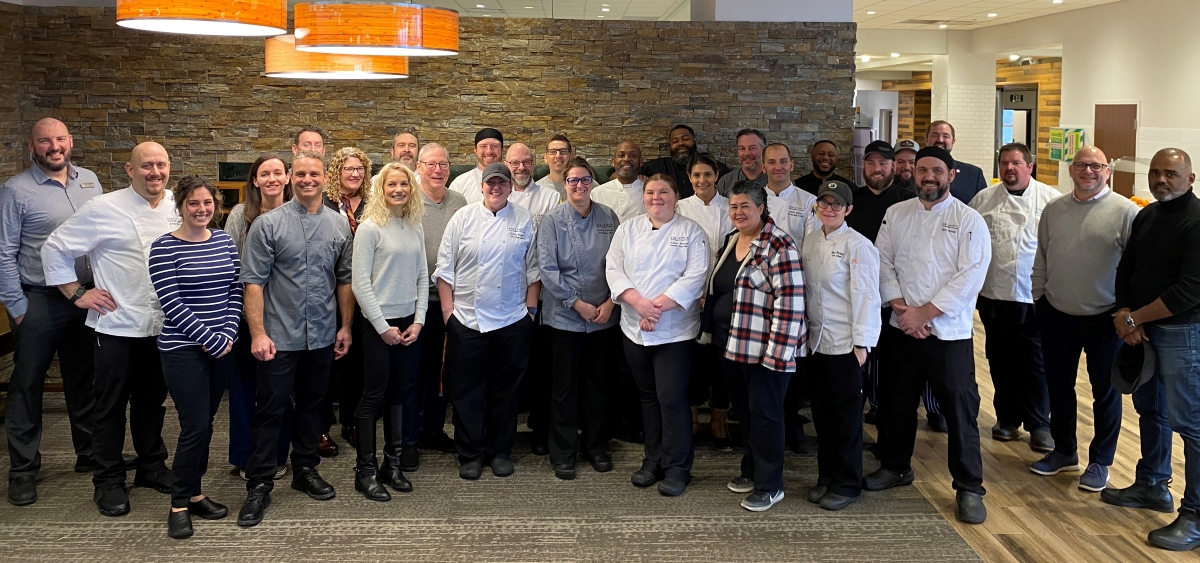
Members of the Southeast-Midwest Region Plant-Forward Culinary Collaborative pose during a plant-forward training at Denison University
For over 15 years, Bon Appétit Management Company has been focused on putting plants at the center of the plate in an effort to fight climate change and promote wellness.
In 2019, we took it a step further, establishing the Plant-Forward Culinary Collaborative (PFCC), a working group that seeks to define the future of plant-forward in our cafés and spread best practices companywide. The PFCC first came together at the Culinary Institute of America’s (CIA) first annual Global Plant-Forward Culinary Summit, with members of Bon Appétit’s wellness team planning an immersive event for chefs nominated from all over the country to serve as founding collaborative members.
One of the keys to the to the success of the PFCC has been chefs learning and sharing with other chefs, which led to the development of regional plant-forward trainings, and the creation of a regional networks of chefs who share plant-forward ideas, recipes, and resources. From the moment the trainings were offered, Bon Appétit teams, in typical fashion, jumped at the opportunity. The collaborative first held trainings in Bon Appétit’s Northeast Mid-Atlantic region, focusing on universities like MIT and the University of Pennsylvania.
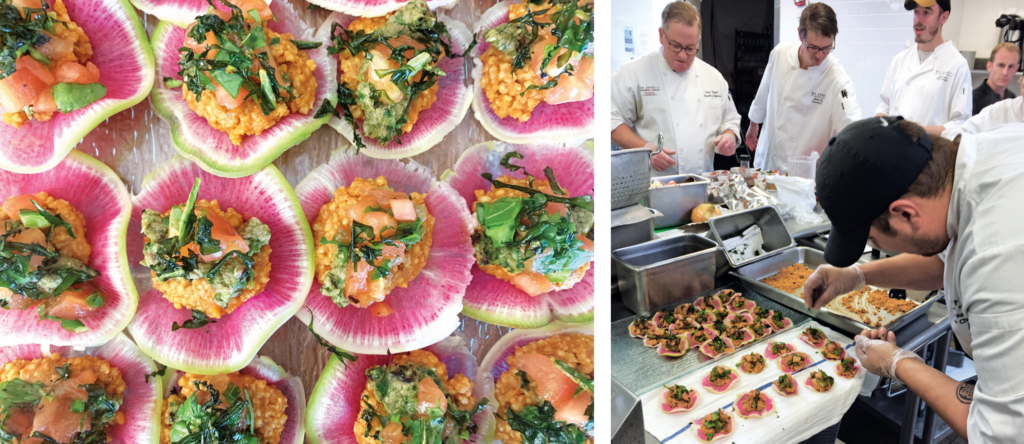
An early plant-forward training at MIT resulted in vibrant watermelon radish tacos
With the onset of COVID-19 in 2020, trainings were put on the back burner as teams focused on keeping their guests and co-workers safe and healthy in the midst of an unprecedented pandemic. But the collaborative’s mission remained, and Bon Appétit’s wellness team worked behind the scenes during the pandemic to further develop the plant-forward training curriculum.
Bringing Passion to Plant-Forward Cooking
As travel picked up again as the pandemic subsided, the wellness team hatched a plan to re-introduce plant-forward trainings to Bon Appétit culinarians across the country. Enter wellness team Executive Chef Chris Lenza, who took charge of the program and ran with it. With help from others on the team, Chris baked flexibility into the training to allow for broader application across different types of business and added to the already comprehensive curriculum. In 2022, Chris led trainings in the Midwest at Macalester College, and in the Southeast-Midwest at Denison University.
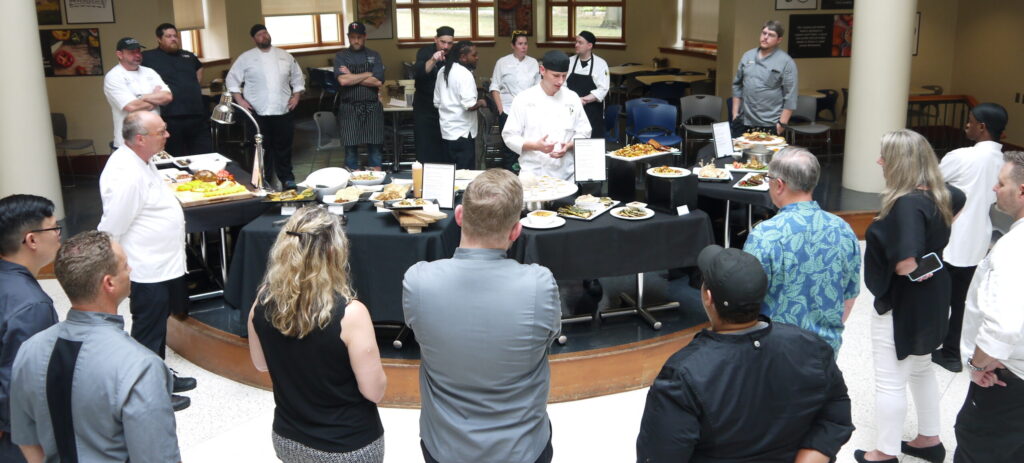
Attendees of a recent Midwest plant forward training at Macalester College look on as Bon Appétit at Macalester Executive Chef Chad Plotnik describes his team’s creations
During each training, a group of chefs and senior leaders are guided through an immersive and hands-on plant-forward exhibition. Chris focuses heavily on teaching plant-forward cooking techniques applicable across all cuisines, including menu mix strategies, the art of plant-forward plating and presentation, and even menu nomenclature. Then it is the team’s turn, with groups of chefs selecting from a plant-forward micro kitchen stocked with ingredients like whole grains, seeds, legumes, tempeh, and a wide array of fruits, vegetables, and mushrooms. The chefs use these ingredients, as well as a “mystery basket” of interesting plant proteins and produce, to cook creative dishes that are later shared presented on a long, family-style table.
Another fun aspect of the training is an event that Chris has dubbed “the battle of the bacon,” where chefs compete to create the best bacon out of the plant-based ingredients they have on hand. Popular options include mushrooms, carrots, sweet potatoes, eggplant, and even spring roll wrappers. “It’s quite a competition, so I don’t want to give too much away,” says Chris. “But as a hint, starchy vegetables tend to work well.”
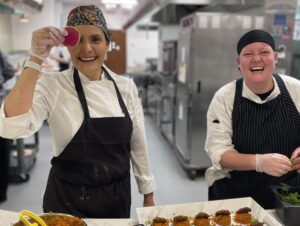
Bon Appétit at Aurora Innovation Executive Chef Amira Cooke (left) holds up a slice of watermelon radish that will go on to garnish the plant-based chorizo medallions created with Bon Appétit at Denison Chef Manager Tiffany Knight (right)
To up the competition ante, chefs get to vote on crowd favorites. At the training held at Denison, the team’s creations included dishes like pinto bean and lentil farro grain bowl with barbecue jackfruit, charred cabbage slaw with vegan mayonnaise, and a spiced sesame crumble. Each group presents their dishes and “we talk through what techniques were used, how these ideas can be implemented in their cafés, and what makes each dish a success,” says Chris. “Then we break bread together sampling all the dishes, and that’s when you get to understand the personal and emotional connection chefs have with their food.”
After each training, participants sign a “Plant-Forward Pledge,” a commitment to implementing what they have learned in their own cafés. Training extends beyond the in-person session to reinforce the learning and keep the momentum going through a post-engagement activity. “Go For the Green,” a six-week activity consisting of weekly menu prompts starts immediately after training. “It’s a way to continue the fun,” says Chris. “Go For the Green helps teams add more plants into the café immediately and keep track of challenges and opportunities along the way.”
Bringing Chefs Together Across the Nation
Beyond bringing chefs together to practice the art and science of plant-forward cooking, the trainings offer an opportunity to build connections between Bon Appétit culinarians. “We see musicians and artists collaborate – and chefs need that opportunity for collaboration too,” says Chris. “After the isolation of the pandemic, this is such a great opportunity for them to get together, work in small groups, and learn from each other.”
After the success of the training at Denison, Chris quickly held another at Emory University in Atlanta, as well as at a cultural institution in Southern California. With more trainings planned, the positive impacts of Bon Appétit’s plant-forward revolution will continue to be felt across the country.
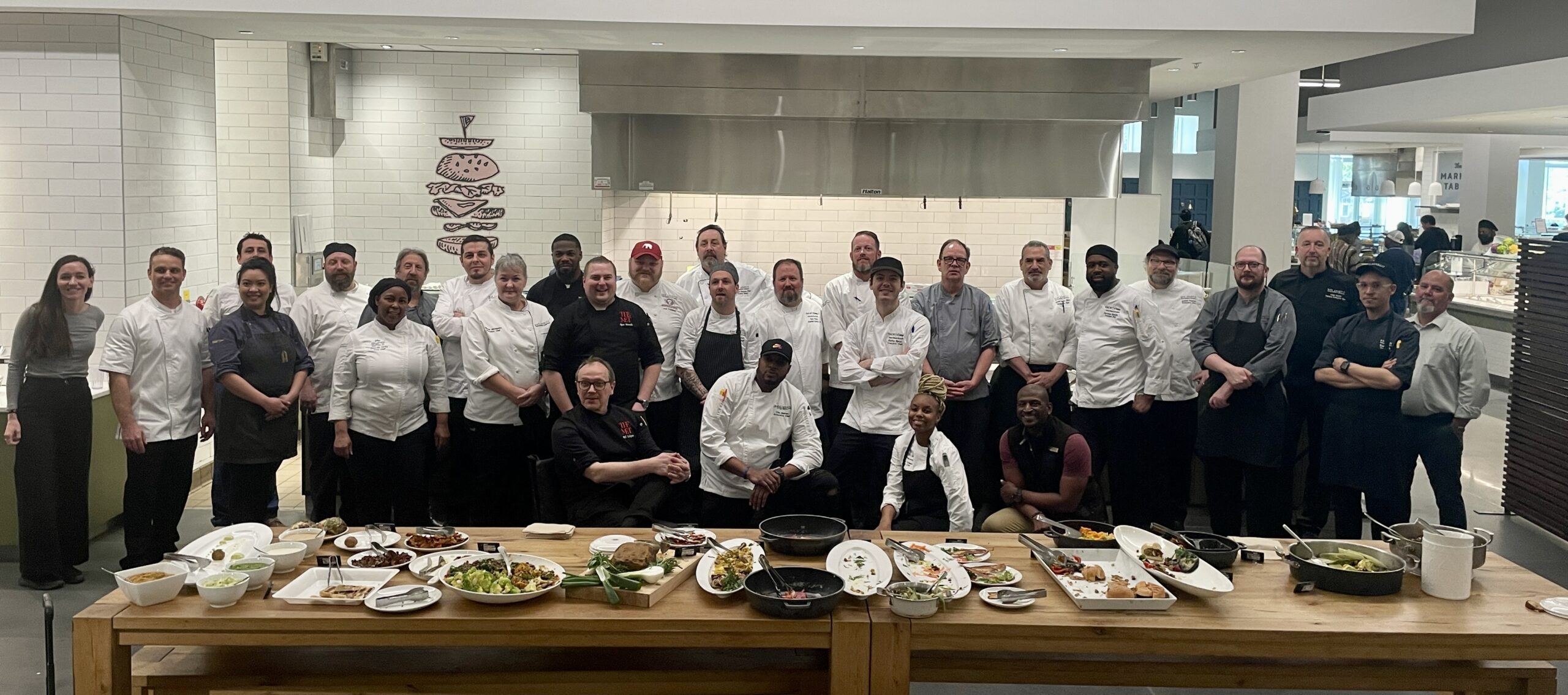
Participants in the Southeast Midwest Plant-Forward training at Emory University pose with their plant-based dishes
